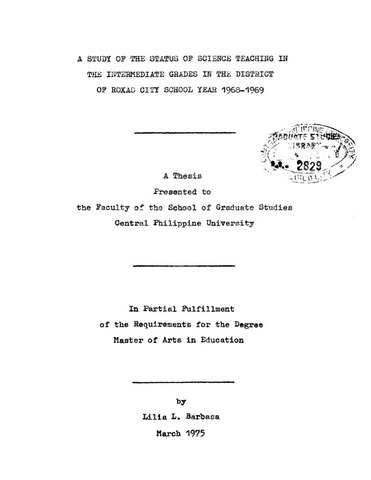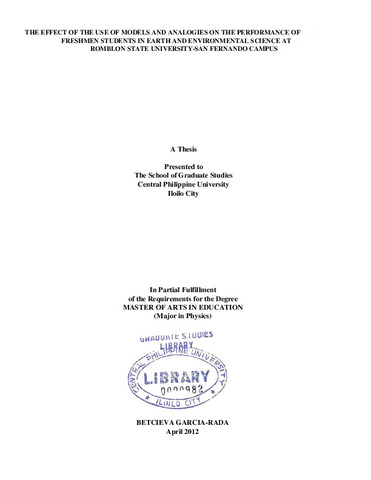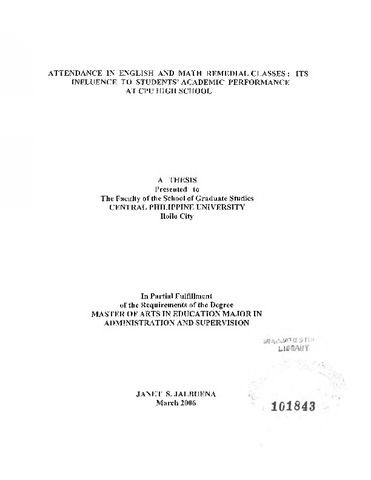Ipakita ang simpleng tala ng item
A study of the status of science teaching in the intermediate grades in the district of Roxas City school year 1968-1969
| dc.contributor.author | Barbasa, Lilia L. | |
| dc.coverage.spatial | Roxas | en_US |
| dc.date.accessioned | 2021-09-23T01:50:37Z | |
| dc.date.available | 2021-09-23T01:50:37Z | |
| dc.date.issued | 1975 | |
| dc.identifier.citation | Barbasa, L. L. (1975). A study of the status of science teaching in the intermediate grades in the district of Roxas City school year 1968-1969 (Unpublished Master’s thesis). Central Philippine University, Jaro, Iloilo City. | en_US |
| dc.identifier.uri | https://hdl.handle.net/20.500.12852/1419 | |
| dc.description | Introduction and statement of the problem | en_US |
| dc.description.abstract | Never has the need for better and more effective science teaching in the Philippines been as widely and deeply felt as it is today. The Philippines has a population explosion. In spite of its favorable climate and suitable soil for producing rice, our staple food, it was only during the crop year 1968-1969 that we produced enough rice for our consumption. For some time now the Philippines has been in a state of insufficiency and of economic dependence on other countries. We have to produce more scientific manpower to solve the above-stated problems and to make full use of our natural wealth. There is also rapid advancement of science in space travel, agriculture, and industry in other countries. The progress in the different fields of science is being seen by our pupils in movies and magazines, and is making their young minds hungry for knowledge. Because of the above-stated problems that beset our country and the role which science can play in solving the problems, educators, scientists, and laymen are unanimous in pointing to the school as the most logical and important agency of overcoming these deficiencies. Throughout the ages the value of education has been recognized by everybody, so that a nation thinks that paying for the education of its youth is an investment that provides a large dividend in the form of increased productivity and a higher socio-economic level for its people. Our school system has been assessed by survey teams time and again and observed critically by the people who are most concerned with our education. Their survey brought to light the fact that the science teaching in our school system is one of the things that needs to be improved. For science teaching in the District of Roxas City to improve, however there must be an accurate and clear picture of the science teaching done in its schools to know its strength and weaknesses. With this in mind, group efforts of the science supervisor, principals, and science teachers may be focused on its weaknesses. Remedial measures may be planned and worked out for a richer curriculum and improved methods in science teaching. Realizing the urgent need to discover teaching and the role teachers can play to help solve the problems, the researcher being a General Science and Biology major with seventeen years of science teaching to her credit, made the first move by conducting a research to evaluate the science teaching in the District of Roxas City. Analysis of the problem A. Importance of the study The much needed scientific manpower unveiled another problem of reassessing our present science program in order that we may know its strengths and weaknesses. With this in mind, educators and our government officials can plan out new policies to develop our youth with potential science talents and enrich our science teaching. Consolidated efforts will thus be focused on the right target, that is, the production of high talent scientific manpower to make us self-sufficient in rice, and the undertaking of scientific research to develop and make full use of the natural wealth our country is endowed with. Hence, the research evaluating the science teaching in the intermediate grades in the District of Roxas City is an important step in the solution of the problems that beset our country. B. Statement of the problem The purpose of this study was to evaluate the science teaching in the intermediate classes in the District of Roxas City, during the school year 1968-1969. The evaluation shall be in the form of a discussion of five major problems: 1. How well were the following achieved? a. Understanding and recall of scientific concepts b. Application of the fundamental scientific processes c. Development of scientific attitudes. 2. Were the science teachers specially trained in science teaching? 3. Did the class schedule provide teachers with time to prepare for class demonstrations, laboratory work and special science projects? 4. How adequate were the instructional materials, science equipment, library and space provision for science instruction? 5. How good was the supervisory assistance which the science teachers received, as to: a. Source of supervision b. Frequency of supervisory visits c. Kind of supervisory assistance given | en_US |
| dc.format.extent | 169 leaves | en_US |
| dc.language.iso | en | en_US |
| dc.subject.ddc | GSL Theses 378.242 B232 | en_US |
| dc.subject.lcsh | Science--Study and teaching (Elementary) | en_US |
| dc.subject.lcsh | Science--Study and teaching | en_US |
| dc.subject.lcsh | Philippines--Roxas | en_US |
| dc.subject.lcsh | Science--Study and teaching (Elementary)--Evaluation | en_US |
| dc.subject.lcsh | Teaching--Evaluation | en_US |
| dc.title | A study of the status of science teaching in the intermediate grades in the district of Roxas City school year 1968-1969 | en_US |
| dc.type | Thesis | en_US |
| dc.description.bibliographicalreferences | Includes bibliographical references | en_US |
| dc.contributor.chair | Ruiz, Macario B. | |
| dc.contributor.committeemember | Alba, Leda G. | |
| dc.contributor.committeemember | Porter, Josefina Y. | |
| dc.contributor.committeemember | Griño, Eliza U. | |
| dc.contributor.committeemember | Tabaldo, Ana J. | |
| dc.contributor.committeemember | Herradura, Elma S. | |
| dc.contributor.department | School of Graduate Studies | en_US |
| dc.description.degree | Master of Arts in Education major in Administration and Supervision | en_US |
| local.relation.associatedcontent | https://repository.cpu.edu.ph/handle/20.500.12852/2156 Journal article published in Southeast Asia Journal | en |





